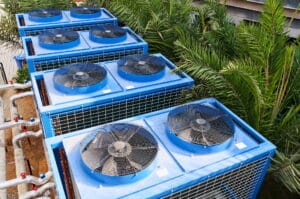
Your air conditioner’s refrigerant is one of the most important parts of your cooling system. You’ve likely heard of “Freon”, or R22, which was recently phased out in favor of the more eco-friendly Puron, or R410A.
One of the common reasons homeowners call for AC repair in Celco, is an issue with their refrigerant. They may have a leak, which can cause trouble for their evaporator, or a problem receiving cool air in their home.
By learning more about how refrigerant works and what it does for your AC, you’ll be better prepared to identify signs of trouble. If you ever suspect there’s an issue with your AC refrigerant, please don’t hesitate to give us a call.
What Is Refrigerant in Air Conditioning?
Refrigerant is a highly specialized chemical that absorbs heat and turns it into cool air. It has a low specific heat, which is the scientific term for the temperature a chemical needs to heat something and cool it down again.
Unlike water, which has a high specific heat, refrigerant can quickly absorb, evaporate, and condense heat in your system. Through this process, your air conditioner is able to continuously provide a steady stream of cool, refreshing air into your home, even on the hottest summer days.
The Refrigeration Cycle
Refrigerant is at the heart of your entire AC’s process. Each cooling cycle runs through these steps, and they all rely on refrigeration to cool your home. The compressor, your outdoor unit, takes low-pressure gas refrigerant and turns it into high-pressured gas. This allows it to move into your internal system. The gas refrigerant leaves your compressor and enters the condenser, where it becomes a liquid. Through a series of coils, the refrigerant loses its heat from the outdoors and becomes a cool liquid. Now, it’s ready to move onto the evaporator.
But first, the refrigerant has to move through an expansion valve or capillary tube. This mechanism allows the fast-moving refrigerant to slow down before it enters the evaporator. The evaporator performs the opposite job of the condenser. Here, the refrigerant is converted back into a gas. It absorbs the heat in the surrounding air, which cools it down before it is blown into your home through ducts and vents.
By changing the pressure of the refrigerant again, the evaporator returns it to its original form before sending it back to the condenser outside.
Does Your AC Ever Run Out of Refrigerant?
Contrary to popular belief, air conditioners are built with enough refrigerant to last a lifetime. However, they can run out if there is a leak along the refrigerant line. When this happens, you’ll need to hire a professional HVAC tech who can patch the leak and refill your lost refrigerant.
If you suspect you have a refrigerant leak, be sure to call for assistance right away. Breathing in refrigerant, or coming in contact with it, poses serious health risks.
Call Celco Heating and Air Conditioning for fast and reliable AC repairs.


